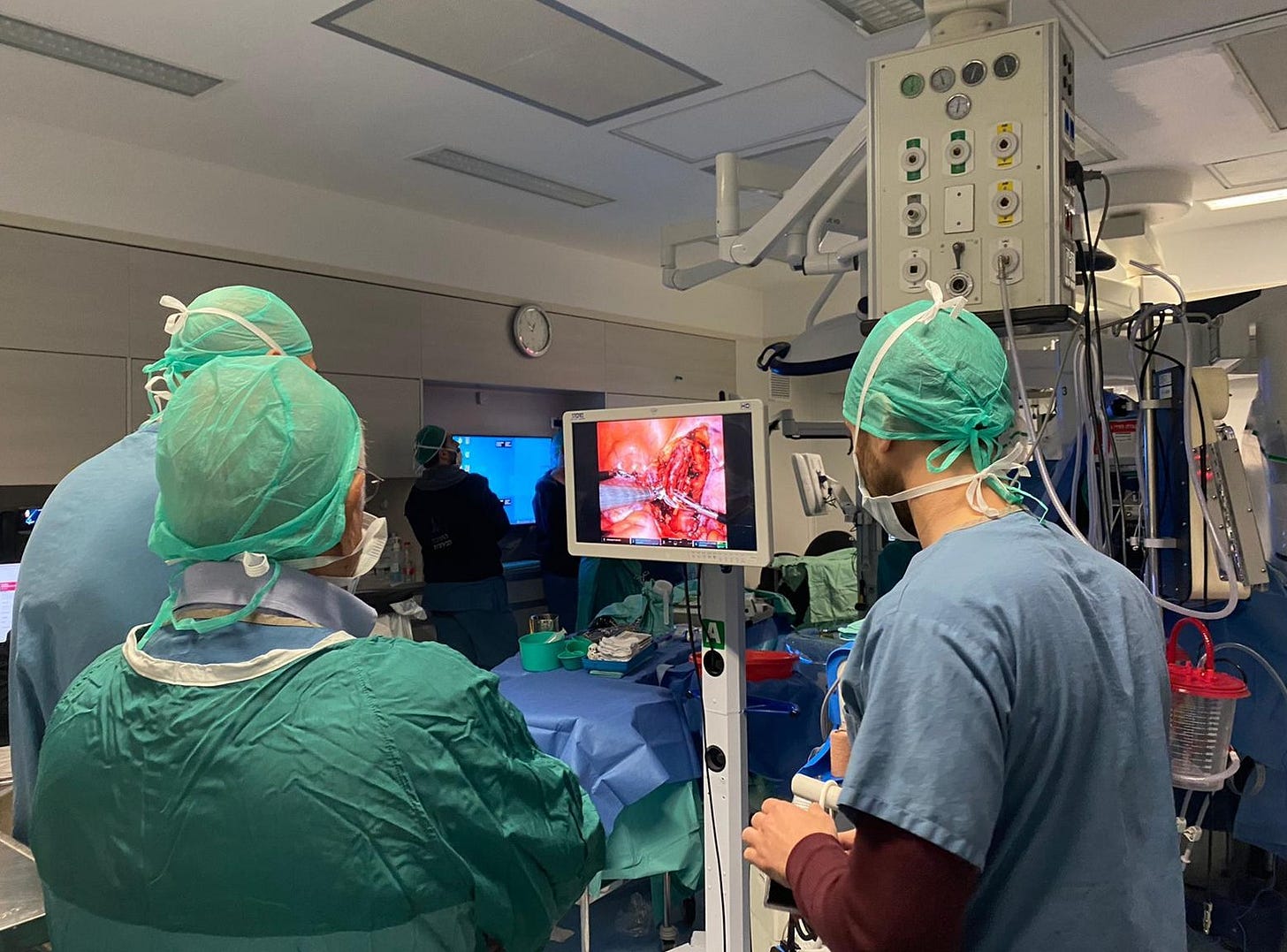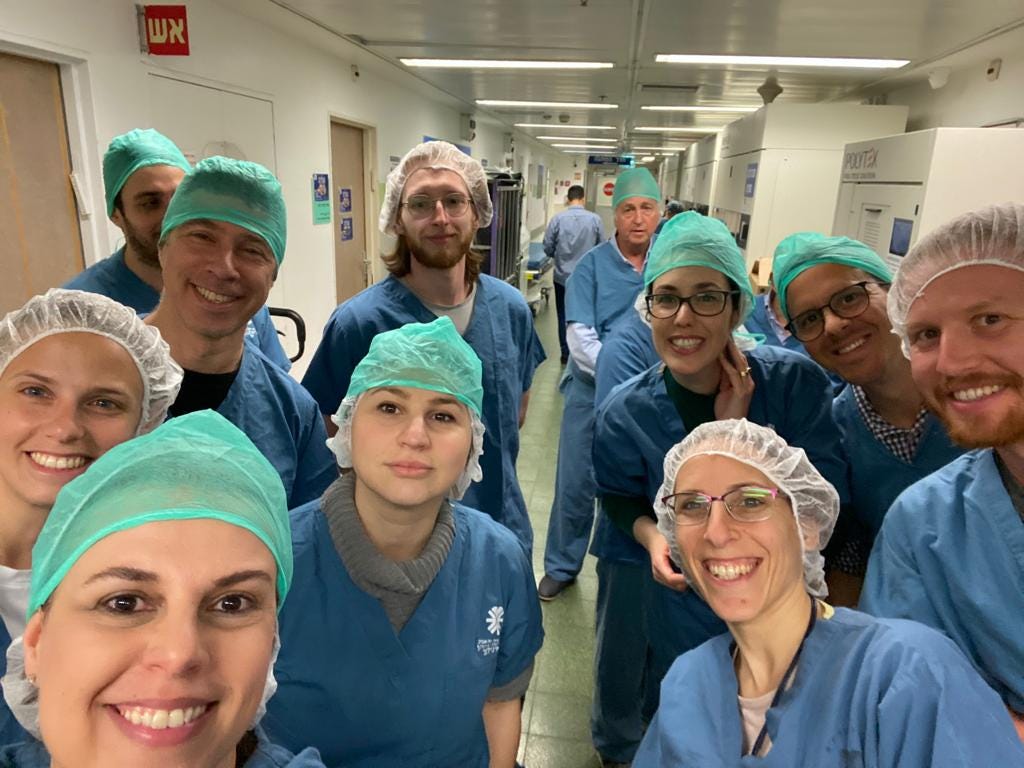Building Bridges between Technologists and Clinicians
About bridging the gap between technology experts and medical professionals, the 8400 network, and how to onboard techies to the clinical universe.
This is the story behind Med4Tech, a program designed to provide clinical background to technology experts, and how it came to life.
It was 2017 when we first launched a private preview of Project New Hope – the unusual story of Project New Hope was told in one of my previous blog posts. My team and I were on a call with a potential customer for the preview, a Clinical Research Organization. Together with me there was one of my senior software engineers, a super capable and highly professional engineer who has earned my upmost respect.
Very early in the call, when the prospect introduced their business, my engineer asked a very, very basic question about some clinical concept they mentioned. So basic that the prospect was overwhelmed.
And that was it. The prospect apparently felt they were talking to people who knew nothing about their industry and did not understand basic clinical concepts. The prospect disengaged and the meeting was practically over. We lost them.
And then it hit me, and I realized that while the passion for healthcare we all shared and the conviction to leverage technology to do good for mankind were key to being successful in this industry, they were not sufficient. You need to understand the industry deeply, you need to speak its terminology, and you need to understand clinical concepts. And not everyone read medicine textbooks in their childhood just for fun (guilty as charged).
This was the pivotal point when I started thinking about creating some sort of training program for techies. But I still had no clue how to do that.
Shaping up the idea
Fast Forward. One of our corporate executives from headquarters visited our local R&D center in 2019, and between reviews and deep dives, we had a chance to talk about his journey. He told me about a program he drove in one of his previous roles in another corporate, that took software engineers who worked on healthcare-related technologies and put them into a 3-weeks bootcamp in a large hospital system in the US, where they did everything, from washing the floors to observing surgeries. That story hit home for me. But a 3-weeks-long bootcamp seemed too much, almost like drinking from a firehose. I thought that maybe this needs to be a more structured program, in a more phased approach.
I reached out to a friend who worked for one of the largest hospitals in the country, to run the idea by her. We met and started outlining what such clinical training for techies could look like if we were to run it in her hospital. But we did not get a chance to take it further.
Because then COVID hit. And if you read the unusual story about the CDC protocol in one of my previous blog posts, you know exactly where I was then - at the frontlines of the Digital First Responders.
And so, the idea was put on hold. But not for long.
8400 The Health Network
Fast forward again, in 2021 I was introduced to 8400.
8400 The Health Network is a non-for-profit, with a mission is to drive HealthTech growth in Israel and accelerate global cure, by building a network of HealthTech ecosystem leaders, across silos and sectors, who learn together and create gap-closing projects that aim to promote the local Health Tech industry. 8400 also works to connect the local ecosystem to global HealthTech hubs.
8400 The Health Network is a non-for-profit, with a mission is to drive HealthTech growth in Israel and accelerate global cure, by building a network of HealthTech ecosystem leaders, across silos and sectors.
I was invited to apply for the next cohort. During the screening process, I was introduced to Daphna Murvitz, Co-founder and CEO of 8400.
Daphna is a truly remarkable woman, with an extensive track record in cross-industry and cross-sector leadership across hi-tech and biomed. Daphna is a change leader who combines vision with practical execution and teamwork to drive impact. And more than anything, she’s a principal force that energizes 8400 and drives it forward.
I shared my vision with Daphna, about creating a program that will educate technology experts about basic clinical concepts, that includes also practical experience in a clinical environment. And it made sense to her. Here’s why.
8400 is also an incubator for programs. 8400 has been leading many industry-wide initiatives and education programs - aiming to drive technology forward in Health & Life Sciences, and creating bridges across the ecosystem. Taking part in a cohort of 8400 means you also work on creating something new. Over the years, 8400 members created programs across the spectrum between technology and medicine, that aim to bridge those gaps. We are all doing this voluntarily.
To mention a few examples of those programs, Big Data in Healthcare provides training of AI and data science, alongside hands-on experience, and targeted at healthcare professionals, clinicians and researchers; SpearHealth by 8400 propels tech entrepreneurs into HealthTech, and creates a cross-disciplinary community of innovators; HealthTech Directors targets senior physicians and healthcare leaders, built in collaboration with the Israel Medical Association and the Hebrew University Business School, aims to promote clinical perspective in HealthTech companies’ boards of directors; and the 8400 Global Expert Program connects local HealthTech executives with top global experts. There are many more programs.
8400 members have created over 20 different successful programs, that are actively impacting the local HealthTech industry. And it was 8400 that finally gave me the platform to create the clinical training program for techies that I was contemplating for so long. I was joined by my 8400 cohort peers Shiko Hershtik, Shoshi Friedman and Dr. Refael Barkan, alongside Tamar Sidi-Maoz from 8400, and later also by Ella Rosen, Prof. Tal Biron-Shental and Dr. Ohad Etzion, who believed in the idea.
And together, we created Med4Tech.
Med4Tech by 8400
Med4Tech is a clinical exposure program for technologists from local and global companies.
The program provides a basic knowledge and understanding of the clinical world.
We designed a 6 months program that combines weekly learning sessions, covering fundamental concepts with monthly training sessions that take place in leading medical centers across the country, providing first-hand experience of real-life challenges of healthcare providers and the clinical environment.
Med4Tech aims to help technology experts better understand the needs of the industry, so they can build better products.
The program is intended for software and hardware engineers, data scientist and product managers in HealthTech and Hi-Tech companies that wish to expand their clinical knowledge and understanding and to enhance their industry knowledge. It aims to help technology experts better understand the needs of the industry, so they can build better products and the most relevant technologies and enable future collaborations between the hi-tech industry and healthcare teams, that would benefit patients.
The program provides participants with the fundamentals of clinical medicine, terminology, regulatory challenges, clinical processes and how they work, the complexities and needs of the system. We cover a wide range of medical fields, aiming to provide a broad introduction. The sessions are led by senior clinicians from a wide range of healthcare organizations. Must say I was humbled and amazed to see the level of engagement from top-notch clinicians who were willing to contribute their time to teach in our program.
The theory part provides basic background in medical sciences, including introductory-level topics such as anatomy, physiology, genetics, biochemistry, metabolism, microbiology, immunology, drug treatment, clinical documentation basics, regulation, and more. The practical side involves exposure to the clinical environment in diverse hospital wards, such as emergency room, operating room, outpatient clinic, intensive care, laboratories, radiology, and others. Every cohort typically also gets one more specialty highlight that we change from time to time, like rehabilitation, OBGYN etc., depending on the hospitals availability.
Over the course of the last years we drove 3 Med4Tech cohorts, providing training to 70+ technologists from across the health tech industry. And with every cohort, we learn something new. We changed into scrubs and attended surgeries, shadowed medical professionals in their work at the ER, seen medical imaging in action, we have visited hospital labs and have seen how pathology labs work, we have heard directly from medical professionals about their challenges and observed cutting edge tech being used by clinicians. And even more important - we helped connect the trainees to the “why” - the meaning of the technology they are building.
We have worked with healthcare systems all across the country, hospitals and community medicine. The program seems to have resonated with many of the clinicians we engaged with. As stated by Prof. Tal Biron, head of the OBGYN department, Meir Medical Center, and my friend from 8400: “From a physician's perspective, meeting smart and motivated people from the industry enhances our understanding of that world. It allows us to address questions about our profession that we have never encountered before. The synergy between contemplating our unmet needs and collaborating with individuals capable of solving them is both amazing and inspiring. The Med4Tech project has already fostered several collaborations, and I have no doubt this is just the beginning. The new era demands multidisciplinary collaborations to elevate our capabilities.”
What’s Next
In a world where global healthcare challenges are becoming increasingly harder, and in this era of Generative AI, when technology evolves almost exponentially, programs like Med4Tech become essential. Healthcare is an industry like no other, and we need to make sure our technologists deeply understand this industry and its pain points, so they can leverage new technologies to solve the right problems. We, as technologists, must stay humble - we may think we know what the healthcare system needs - but many times we don’t. We need to fully understand the challenges and we need to listen.
By bridging the gap between tech and medicine, we're paving the way for a healthier, more efficient future.
We, as technologists, must stay humble - we may think we know what the healthcare system needs - but many times we don’t. We need to understand the challenges and we need to listen.
Med4Tech by 8400 cohort #4 is now open for applications. If you are a technologist in health tech, located in Israel and interested in improving your understanding of the clinical universe, apply here: https://www.med4tech.net/
On a more personal note, I had the privilege to engage with several of the 8400 programs over the years. In some of them, I volunteered to teach and shared my experience; in other programs, I was learning from others.
8400 has been a phenomenal experience for me. Beyond an opportunity to impact the local industry, 8400 provided me with the opportunity to connect with like-minded people from across the industry. It is not very common to find new friends in this stage in your career, and 8400 helped me make new friends who share a similar passion for improving global healthcare.
Let’s continue to change healthcare for the better, friends, making a difference, one small step at a time.
About Verge of Singularity.
About me: Real person. Opinions are my own. Blog posts are not generated by AI.
See more here.
LinkedIn: https://www.linkedin.com/in/hadas-bitran/
X: @hadasbitran
Instagram: @hadasbitran
Recent posts:








Excellent article about an excellent program